Daily Vocabulary Words: List of Daily Used Words in Leading International Newspapers
Hi there. Welcome to this special section @ Wordpandit.
Our endeavour here is very simple: to highlight important daily vocabulary words, which you would come across in leading newspapers in the country. We have included the following newspapers in our selection:
• The New York Times
• The Washington Post
• Scientific American
• BBC
• The Guardian
• Psychology Today
• Wall Street Journal
• The Economist
We are putting in extensive work for developing your vocabulary. All you have got to do is be regular with this section and check out this post on a daily basis. This is your repository of words that are commonly used and essentially, we are posting a list of daily used words. Hence, this has significant practical application as it teaches you words that are used commonly in leading publications mentioned above.
Visit the website daily to learn words from leading international newspapers.
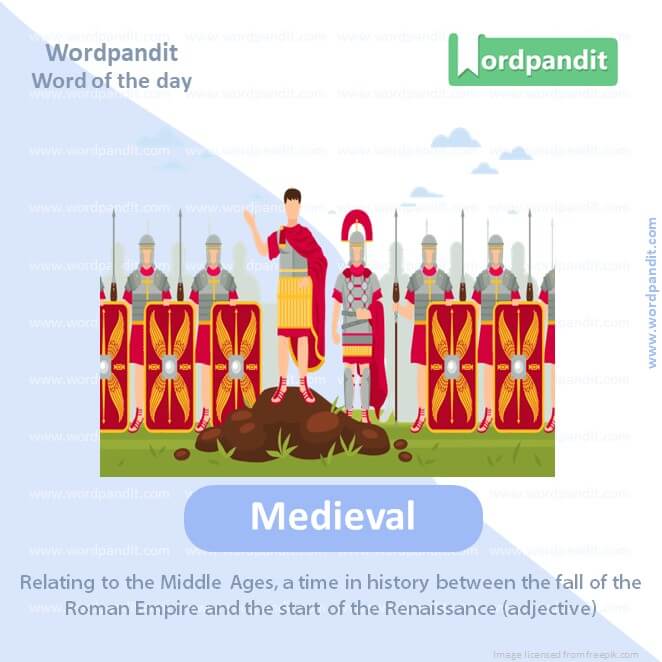
WORD-1: Medieval
CONTEXT: An almost medieval siege of the sort now being enforced on Gaza, depriving it of power and water, or the gunfire and shelling of the urban battle that may begin there at any time, can kill innocent civilians too.
SOURCE: The Guardian
EXPLANATORY PARAGRAPH: Imagine a time long, long ago when knights in shiny armor saved princesses from dragons, and there were big stone castles. This time was called the “medieval” period. It was a very old time in history.
MEANING: Relating to the Middle Ages, a time in history between the fall of the Roman Empire and the start of the Renaissance (adjective).
PRONUNCIATION: meh-DEE-ee-vuhl
SYNONYMS: Middle-Aged, Gothic, Chivalric, Feudal, Knightly, Dark Age, Antiquated
USAGE EXAMPLES:
– The medieval castle was made of huge stone walls.
– During medieval times, people traveled by horse.
– The artwork has a medieval feel to it.
– I love reading about medieval legends and heroes.
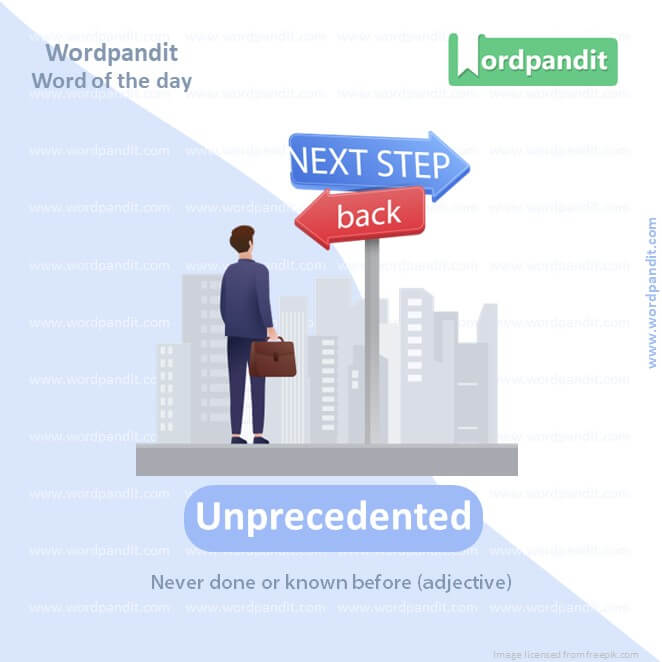
WORD-2: Unprecedented
CONTEXT: In the immediate aftermath of the unprecedented Hamas attack on Israel from Gaza
SOURCE: Al Jazeera
EXPLANATORY PARAGRAPH: Imagine something happens for the very first time ever, and no one has ever seen or heard of it before. That’s what “unprecedented” means. It’s like having ice cream in the shape of a star for the first time ever!
MEANING: Never done or known before (adjective).
PRONUNCIATION: un-PRESS-suh-den-tid
SYNONYMS: Novel, Newfangled, Unparalleled, Unique, Unheard-of, First-time, Innovative
USAGE EXAMPLES:
– The athlete set an unprecedented record.
– We had an unprecedented amount of snow this winter.
– The play received unprecedented applause.
– His talent was of unprecedented scale.
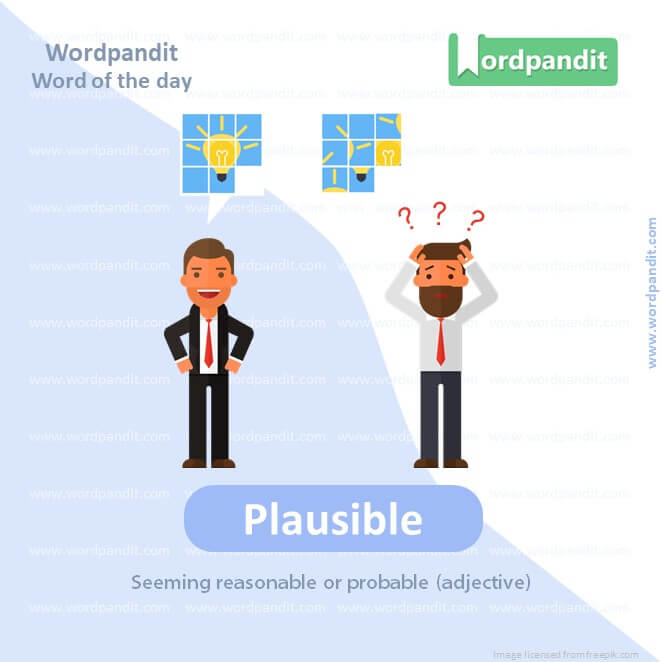
WORD-3: Plausible
CONTEXT: I have yet to see any plausible scenarios in which Palestinians acquire the means to deploy
SOURCE: Al Jazeera
EXPLANATORY PARAGRAPH: Imagine if your friend told you that elephants can fly. You might think, “Hmm, that doesn’t sound right.” But if they told you that birds can fly, you’d think, “That sounds right!” When something sounds like it could be true, we say it’s “plausible”.
MEANING: Seeming reasonable or probable (adjective).
PRONUNCIATION: PLOZ-uh-bul
SYNONYMS: Believable, Credible, Feasible, Likely, Probable, Possible, Conceivable
USAGE EXAMPLES:
– Her excuse for being late was plausible.
– It’s plausible that it might rain tomorrow.
– The story seemed plausible, but it was hard to believe.
– Given the evidence, it’s a plausible theory.
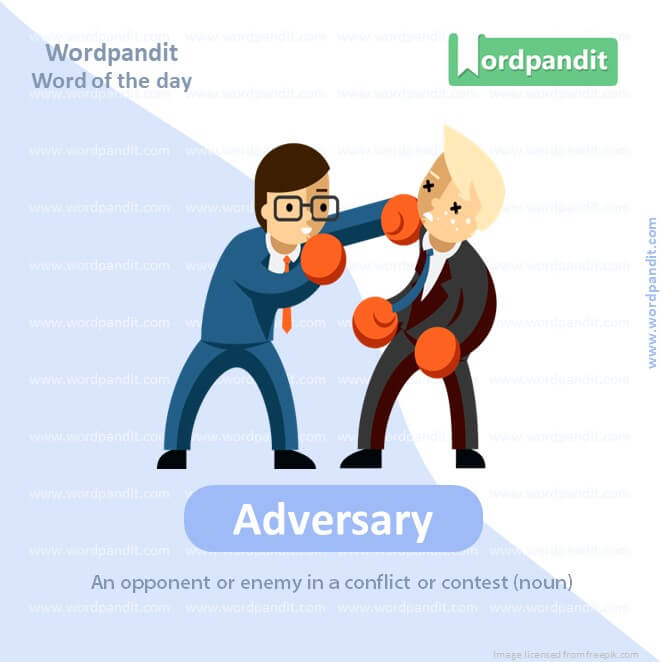
WORD-4: Adversary
CONTEXT: Palestine is not Ukraine, supported by major powers and able to utilise land, water and air corridors to obtain an unending stream of weapons deliveries to fight a much larger and better-armed adversary.
SOURCE: Al Jazeera
EXPLANATORY PARAGRAPH: Imagine you’re playing a game, and there’s someone on the other team trying to beat you. That person is called an “adversary”. They’re like a rival or opponent in a game.
MEANING: An opponent or enemy in a conflict or contest (noun).
PRONUNCIATION: AD-ver-sair-ee
SYNONYMS: Opponent, Rival, Enemy, Foe, Antagonist, Competitor, Challenger
USAGE EXAMPLES:
– The two companies have always been adversaries.
– He saw his adversary approaching in the distance.
– The hero faced many adversaries on his journey.
– She prepared to debate her main adversary.
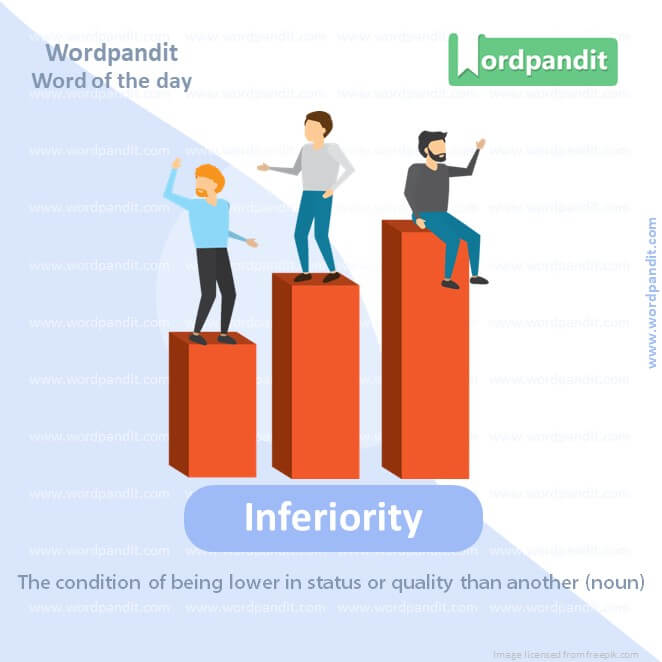
WORD-5: Inferiority
CONTEXT: At this moment, “violence … frees the native from his inferiority complex and from his despair and inaction
SOURCE: Al Jazeera
EXPLANATORY PARAGRAPH: Imagine you have two ice creams. One is super big, and the other is tiny. The tiny one seems less or not as good as the big one. That feeling of being less or not as good is called “inferiority”.
MEANING: The condition of being lower in status or quality than another (noun).
PRONUNCIATION: in-feer-ee-OR-ih-tee
SYNONYMS: Lesser status, Subordination, Lower rank, Secondariness, Subservience, Subjugation, Lowerness
USAGE EXAMPLES:
– He felt a sense of inferiority next to his talented brother.
– The team’s inferiority was evident in the match.
– She struggled with feelings of inferiority.
– Despite his inferiority in experience, he tried hard.
WORD-6: Shackle
CONTEXT: that shackle efforts to project a coherent European foreign policy and wield influence in the world, or even on Europe’s doorstep.
SOURCE: Al Jazeera
EXPLANATORY PARAGRAPH: Imagine a metal ring that can be locked around a person’s wrist or ankle to stop them from moving freely. That’s a “shackle”. It’s like when you play “pretend jail” and you pretend your hands are tied.
MEANING: A metal link, usually one of a pair, fastened around a person’s wrist or ankle (noun). To restrain or restrict someone’s freedom (verb).
PRONUNCIATION: SHACK-ul
SYNONYMS: Chain, Manacle, Handcuff, Fetter, Bond, Iron, Restraint
USAGE EXAMPLES:
– The prisoner was put in shackles.
– The government tried to shackle the press.
– They felt shackled by the strict rules.
– The dog was shackled to the post.
WORD-7: Breaches
CONTEXT: She made no mention of breaches of international law.
SOURCE: The Guardian
EXPLANATORY PARAGRAPH: Imagine a big wall of sand, and suddenly water breaks through and makes a hole. That hole is a “breach”. It’s like when you build a wall of blocks and someone breaks a part of it.
MEANING: An act of breaking or failing to observe a law, agreement, or code of conduct (noun). To break through or make a hole in something (verb).
PRONUNCIATION: BREE-chiz
SYNONYMS: Violations, Breaks, Infringements, Gaps, Rifts, Contraventions, Trespasses
USAGE EXAMPLES:
– There were several breaches of the contract.
– The dam had a breach, and water started flowing out.
– They were sued for breach of agreement.
– The army breached the enemy’s wall.
WORD-8: Stifled
CONTEXT: which could barely be stifled for a momentary show of unity after Hamas’s barbaric assault.
SOURCE: The Guardian
EXPLANATORY PARAGRAPH: Imagine you want to laugh really loud in a quiet place, but you cover your mouth to stop it. That’s “stifling” your laugh. It means holding back or stopping something from happening.
MEANING: To stop or hold back a reaction or feeling (verb).
PRONUNCIATION: STY-full-d
SYNONYMS: Suppress, Smother, Restrain, Choke, Quell, Muffle, Hush
USAGE EXAMPLES:
– She stifled a yawn during the boring lecture.
– The fire was stifled by the firefighters.
– His creativity was stifled by strict rules.
– He stifled his anger and responded calmly.
WORD-9: Fraudulent
CONTEXT: lawyers caught coaching migrants on how to remain in the country by fraudulent means.
SOURCE: The Guardian
EXPLANATORY PARAGRAPH: Imagine someone telling you they’re a superhero, but you find out they’re just pretending. That’s being “fraudulent”. It means someone is trying to trick others by being dishonest.
MEANING: Intended to deceive others, typically to gain something unlawfully (adjective).
PRONUNCIATION: FROD-yuh-lent
SYNONYMS: Deceptive, Dishonest, Counterfeit, Fake, Deceitful, Misleading, Sham
USAGE EXAMPLES:
– The signature on the document was fraudulent.
– He was arrested for fraudulent activities.
– She realized the offer was fraudulent.
– They were warned of a fraudulent scheme.
WORD-10: Relentless
CONTEXT: have been so relentless that if a Starmer premiership can bring this sometimes frightening time to an end
SOURCE: The Guardian
EXPLANATORY PARAGRAPH: Imagine a toy train that keeps going and going without stopping, no matter what’s in its way. That’s “relentless”. It means to be very determined and not giving up.
MEANING: Extremely persistent and unyielding (adjective).
PRONUNCIATION: re-LENT-less
SYNONYMS: Unstoppable, Persistent, Unyielding, Tireless, Determined, Steadfast, Continual
USAGE EXAMPLES:
– The relentless sun made the day very hot.
– She was relentless in her pursuit of knowledge.
– The team had a relentless drive to win.
– His relentless work ethic was admirable.
Vocabulary Today
In the dynamically evolving spectrum of language, staying updated with ‘vocabulary today’ is an integral part of mastering a language. These topical, contemporary words breathe vitality into our communication, bridging the gap between language learning and language living. But, how can we effectively learn ‘vocabulary today’?
Grasping ‘vocabulary today’ begins with exposure to contemporary contents. Engaging with current publications, social media platforms, movies, music, podcasts, and digital content can dive you into the real-world usage of ‘vocabulary today’. These platforms imbibe the vocabulary of the day, reflecting the evolution in language.
To consolidate the learning of ‘vocabulary today’, utilize memory-enhancing tools. Flashcards, language learning apps, or memory-enhancement software can make your study session an engaging venture and enhance word retention.
However, the secret sauce to learning ‘vocabulary today’ is practice. Inculcating these words in your regular dialogues, written correspondences, or social media posts will reinforce your grasp over these words. It brings you closer to ‘vocabulary today’, enhancing your language adaptability and fluency.
Better understanding of ‘vocabulary today’ can be achieved by staying connected with diverse social platforms which bring words from across locations and cultures, expanding your linguistic understanding. Also, participating in language forums, discussion groups, or language exchange platforms provides great insights into ‘vocabulary today’.
In the final analysis, staying abreast with ‘vocabulary today’ is an exciting quest that requires consistent exposure, active practice, and social engagement. As you embrace this journey, you will find your language proficiency growing with every new word, enabling you to step into the dynamic world of contemporary language with confidence and mastery. Remember, ‘vocabulary today’ is not static, it flows like a river, always fresh, always changing, and always enriching!











